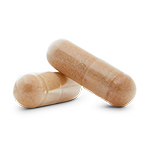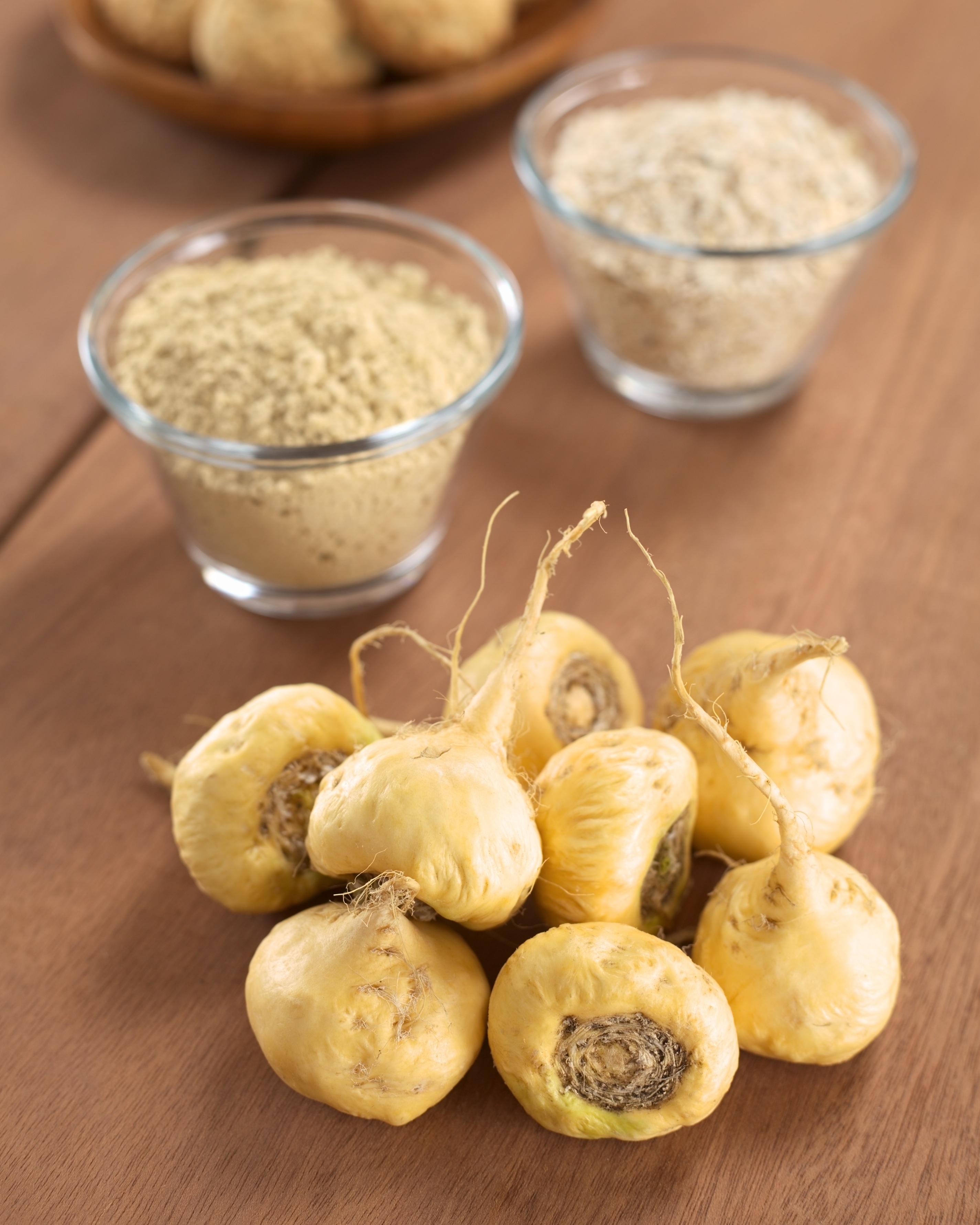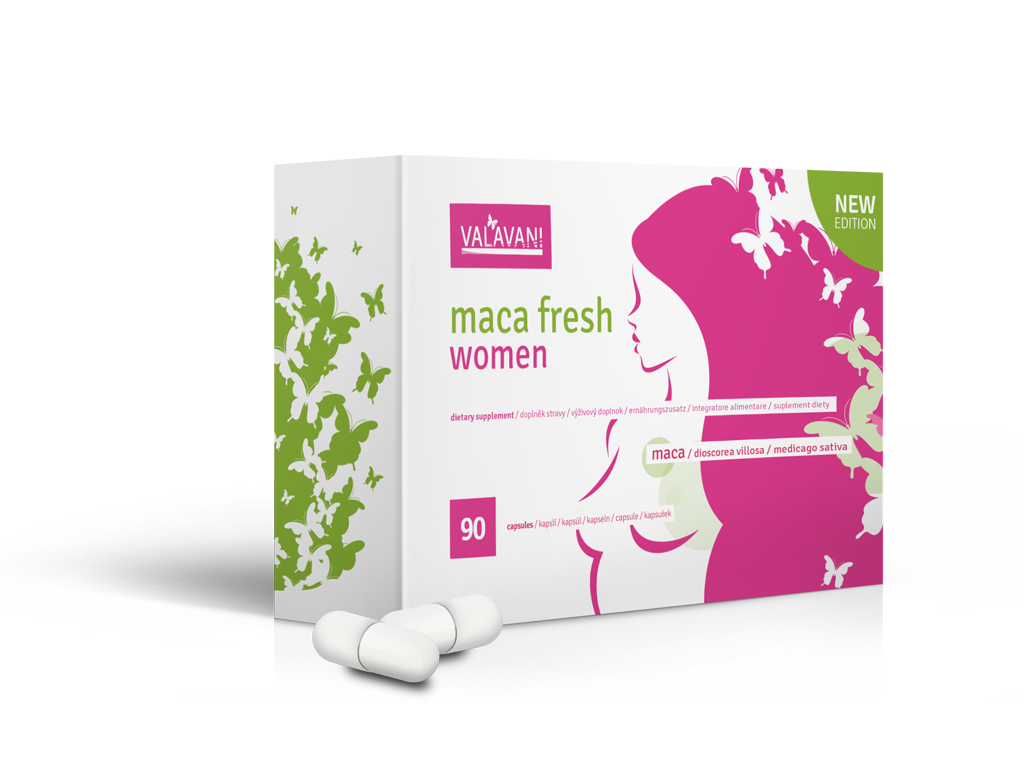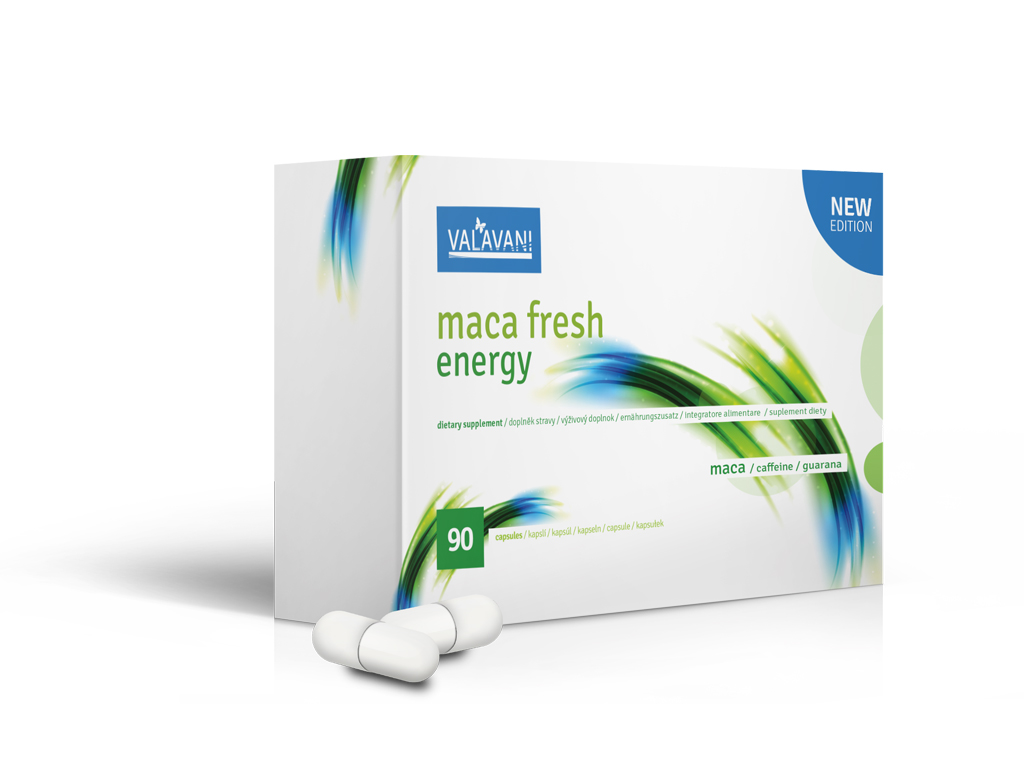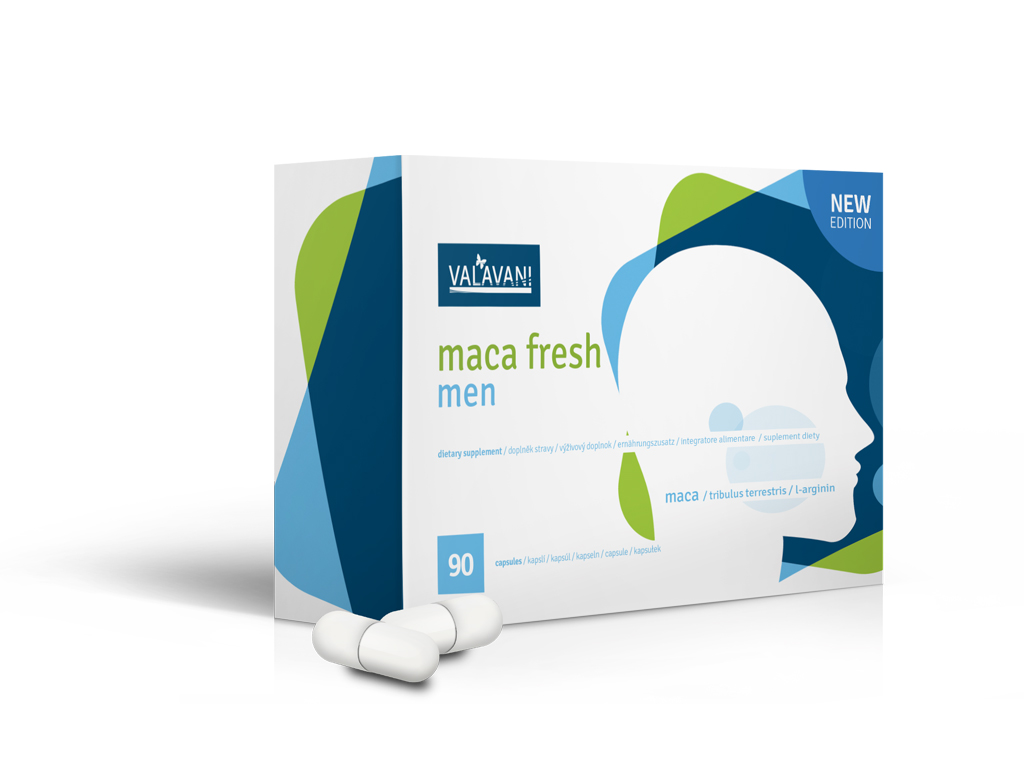|
Podľa lekárskej štúdie z roku 1998 ktorá bola publikovaná v roku 2000 v odbornom lekárskom časopise Urology má MACA veľmi pozitívne účinky na:
Imunita - maca je svojím zložením ideálna a stimuláciu imunity, obsahuje: malé množstvo tuku a 10 -14% proteínov, zložených z 19 aminokyselín vrátane 7 esenciálnych, je zdrojom 31 minerálov – vápnik, draslík, železo, zinok, mangán, meď, horčík, fosfor, selén a ďalšie. Okrem toho má silné zastúpenie vitamínov – C, B1, B2, B3, B6, B12, E Myseľ - zlepšuje stav mysli. Zvyšuje sa hladina DHEA (materinský hormon). Úzkosť - maca zlepšuje stavy úzkosti už za niekoľko dní užívania. Sexualitu – zvyšuje libido, sexuálna túžba narastá v priemere o 180 % v porovnaní s placebo skupinou. Hladina hormónov pritom ostáva neovplyvnená. Až dvojnásobne zvyšuje počet spermií a tiež efektívne a priaznivo pôsobí na ich kvalitu. Stres – znižuje hladinu stresu, redukuje stupeň apatie mysli a navodzuje lepšie reakcie mysle na stresové situácie. Výživu - maca má dôležitý vplyv na tvorbu energie a tento efekt sa dáva do súvislosti s priaznivým pôsobením Macy na hladinu ľudského rastového hormónu. Energii zvyšuje tím, že pôsobí na metabolizmus tukov a efektívne podnecuje rýchlosť ich spaľovania. Nespôsobuje uvoľňovanie jódu do moču ako je to u syntetických prípravkov.. Svaly – napomáha regenerácií a nárastu svalovej hmoty, čo je vďaka jej zloženiu - kombináciou bielkovín, carbohydrátov a zmesi mastných kyselín. Krv - liečba Macou pôsobí na znižovanie diastolického krvného tlaku, neovplyvňuje srdečnú frekvenciu ani arteriálnu saturáciu kyslíkom, nemení sa krvný obraz ani hematokrit.
Štúdia bola vykonaná pod dohľadom Dr. Qun Yi Zhenga a jeho kolegov z PureWorld Botanicals. Urobili komplexný a podrobný laboratórny rozbor zloženia maci. Analýza potvrdila: že obsahuje 10 % bielkovín, 60 % carbohydrátov a zmes mastných kyselín. Čo je však zaujímavé je objavenie dvoch nových skupín zlúčenín, macamidy a macaeny a tieto sú v plnej miere zodpovedné za zvýšenú sexuálnu aktivitu, pre užívaní Maci. Následna potom bol tento objav overovaný v sérií experimentov na zvieratách a výsledky boli prekvapujúco pozítívne. Testy boli publikovaná tiež v v odbornom lekárskom časopise Urology. Pokusní hlodavci dostávali purifikovaný extrakt z Macy, ktorý obsahoval koncentrát macamidov a macanaeov a bola zaznamenaná zvýšená energia a životná sila, hlodavci sa prejavovali zvýšenou sexuálnou aktivitou v porovnaní sa skupinou hlodavcov, ktorí nedostávali macamidy a macaeny. Lepidium meyenii - MACA – peruánska rastlina, presnejšie, peruánska žerucha, spracovaná účinná látka (prášok, gelanitized, fresh) v kapsuliach, bola podávaná dospelým mužom, ktorí boli v relatívne dobrom zdravotnom stave. |
Ďalšia štúdia v rokoch 2000-2001 bola pripravená za účelom, preukázania účinnosti Lepidium meyenii (maca) na mužskú erekciu, potenciu, hormonálny systém, sexuálne chovanie na fyzické zdravie a stres, zvýšenie energie, na červené krvinky a celkovo na výživu potrebnú k vitálnemu zdraviu.
Do štúdie boli zapojení muži najproduktívnejšieho veku a to od 20 do 40 rokov. Bola urobená náhodná skúška, kde jedna skupina dostávala kapsule s Maca a druhá skupina len placebo. Štúdia prebiehala takmer cely polrok a to v dobe od decembra 2000 do mája 2001 a robehla na Peruvian University Cayetano Heredia na katedrou Sciences and Philosophy and Instituto de Investigaciones de la Altura (Institute of Highlands Researches).
Štúdia len potvrdila už získane poznatky z predchádzajúcich skúmaní účinkov rastliny Maca:
- zlepšuje stav mysli
- znižuje úzkosť a stres
- zdokonaľuje reakciu na stres
- zvyšuje hladinu androgenov
- zlepšuje libido a sexuálnu túžbu
- zvyšuje počet a zlepšuje aktivitu spermií
MACA FRESH WOMAN
Unikátny produkt zostavený špeciálne pre ženy, ktoré chcú podporiť svoju sexualitu, fyzické a psychické zdravie a alebo chcú zmierniť nepriaznivé príznaky spojené s menopauzou. MACA FRESH WOMAN je obohatená o ďalšie dve výnimočné byliny.
Zloženie:
Maca extrakt (Lepidium meyenii) 900 mg
Lucerna siata (Medicago sativa) extrakt 300 mg
Wild yam (Dioscorea villosa) extrakt 90 mg
MACA FRESH ENERGY
Unikátny produkt zostavený špeciálne pre mužov i ženy, ktorý chcú dodať svojmu telu energiu, chcú zlepšiť svoje intímne zdravie, podporiť sexualitu a urobiť niečo pre svoje psychické a fyzické zdravie a pohodu.MACA FRESH ENERGY je obohatená o ďalšie dve výnimočné byliny.
Zloženie:
Maca extrakt (Lepidium meyenii) 750 mg
Guarana extrakt (Paullinia cupana) 300 mg
Kofein 200 mg
Unikátny produkt zostavený špeciálne pre mužov, ktorí chcú zlepšiť svoj sexuálny výkon, erekciu, plodnosť, dodať svojmu telu energiu a urobiť niečo pre svoje intímne, psychické i fyzické zdravie a pohodu.MACA FRESH MAN je obohatená o ďalšie dve výnimočné byliny
Zloženie:
Maca extrakt (Lepidium meyenii) 750 mg
L-arginin 450 mg
Tribulus terrestris extrakt 150 mg
REFERENCES
- Action Group on Erosion, Technology and Concentration. Biopiracy. Ottawa, ON: ETC Group; 2006. Available at: http://www.etcgroup. org/en/issues/biopiracy.html
- Congreso de la Republica del Peru. Ley No 28216: Ley de protección al acceso a la diversidad biológica Peruana y los conocimientos colectivos de los pueblos indigenas. El Peruano Diario Oficial—Normas Legales. May 1, 2004; XXI(8714):26758-26759.
- World Trade Organization. Article 27.3(B), Relationship between the TRIPS Agreement and the CBD and Protection of Traditional Knowledge and Folklore. Communication from Peru (Revision).
- Geneva, Switzerland: WTO Council for Trade-Related Aspects of Intellectual Property Rights; May 19, 2005; IP/C/W/441/Rev.1.
- Bazán Leigh S. Casos de Bio-pirateria para productos naturales y acciones adoptadas. In: Perú Natura 2006: Foro y exposición de Ingredientes y Productos Naturales. September 26-27, 2006, Hotel Plaza del Bosque, San Isidro, Lima, Perú.
- Brinckmann J. LatinPharma Expo 2003, Lima Perú: Natural Products Roundtable, Trade Show, Buyers/Sellers Meeting. HerbalGram. 2003;No. 60:68-70.
- Zheng BL, Kim CH, Wolthoff S, He K, Rogers L, Shao Y, Zheng QY. Compositions and Methods for their Preparation from Lepidium. WO Patent 00/51548. PCT Gazette, Section I. September 8, 2000;12758.
- World Intellectual Property Organization. Patents Referring to Lepidium meyenii (Maca): Responses of Peru. In: Intergovernmental Committee on Intellectual Property and Genetic Resources, Traditional Knowledge and Folklore, Fifth Session, Geneva, July 7-15, 2003. Geneva, Switzerland: WIPO. May 12, 2003; WIPO/GRTKF/ IC/5/13.
- Zheng BL, Kim CH, Wolthoff S, He K, Rogers L, Shao Y, Zheng QY. Extract of Lepidium meyenii for pharmaceutical applications. United States Patent 6,267,995. Washington, DC: United States Patent and Trademark Office (USPTO). July 31, 2001.
- Zheng BL, Kim CH, Wolthoff S, He K, Rogers L, Shao Y, Zheng QY. Treatment of sexual dysfunction with an extract of Lepidium meyenii roots. United States Patent 6,428,824. Washington, DC: United States Patent and Trademark Office (USPTO). August 6, 2002.
- Zheng BL, He K, Shao Y, Zheng QY. Compositions and methods for their preparation from Lepidium. United States Patent 6,552,206. Washington, DC: United States Patent and Trademark Office (USPTO). April 22, 2003.
- DeLuca DL, Sparks WS, DeLuca DR. Maca and antler for augmenting testosterone levels. United States Patent 6,093,421. Washington, DC: United States Patent and Trademark Office (USPTO). July 25, 2000.
- Hastings CW, Barnes DJ, Daley CA. Dietary Supplement. United States Patent 6,368,617. Washington, DC: United States Patent and Trademark Office (USPTO). April 9, 2002.
- Heleen PA. Herbal composition for enhancing sexual response. United States Patent 6,444,237. Washington, DC: United States Patent and Trademark Office (USPTO). September 3, 2002.
- Barone FV, Jacobsen C, Chumenko K. Topical compositions for enhancing sexual responsiveness. United States Patent 7,214,390. Washington, DC: United States Patent and Trademark Office (USPTO). May 8, 2007.
- Cui B, Zheng BL, He K, Zheng QY. Imidazole alkaloids from Lepidium meyenii and methods of usage. United States Patent 6,878,731. Washington, DC: United States Patent and Trademark Office (USPTO). April 12, 2005.
- Ogawa H, Mitsunaga T, Kawamura Y. Functional food product containing maca. In: Patent Abstracts of Japan—Publication number: 2004-000171. Tokyo, Japan: Japanese Patent Office. January 8, 2004.
- Ogawa H, Matsuo T. Testosterone-increasing composition, testosterone-increasing food, testosterone-increasing skin care preparation for external use and testosterone-increasing medicine. In: Patent Abstracts of Japan—Publication number: 2005-306754. Tokyo, Japan: Japanese Patent Office. November 4, 2005.
- Gonzales GF, Cordova A, Vega K, Chung A, Villena A, Gonez C. Effect of Lepidium meyenii (Maca), a root with aphrodisiac and fertility-enhancing properties, on serum reproductive hormone levels in adult healthy men. J Endocrinol. 2003;176(1):163-168.
- Gonzalez GF, Cordova A, Gonzalez C, Chung A, Vega K, Villena A. Lepidium meyenii (maca) improved semen parameters in adult men. Asian J Androl. 2001;3(4):301-3.
- Matsumoto T, Kato M. Alcoholic drink containing maca extract. In: Patent Abstracts of Japan—Publication number: 2005-312430. Tokyo, Japan: Japanese Patent Office. November 10, 2005.
- Hirose Y, Hirose K, Nakajima H, Nakajima H. Composition for preventing male climacteric disorder and beverage and foods including the same. In: Patent Abstracts of Japan—Publication number: 2006-069970. Tokyo, Japan: Japanese Patent Office. March 16, 2006.
- Yamada S, Nasu A, Iwata Y. Improving agent of indefinite complaint accompanying with autonomic imbalance. In: Patent Abstracts of Japan—Publication number: 2006-143664. Tokyo, Japan: Japanese Patent Office. June 8, 2006.
- World Trade Organization. Article 27.3(b), Relationship between the TRIPS Agreement and the CBD and Protection of Traditional Knowledge and Folklore. Communication from Peru. Biodiversity, Traditional Knowledge and Intellectual Property: Peru’s Position in Relation to Disclosure of Origin and Legal Provenance. Geneva, Switzerland: WTO Council for Trade-Related Aspects of Intellectual Property Rights. June 8, 2005; IP/C/W/447.
- World Trade Organization. Analysis of Potential Cases of Biopiracy: The Case of Camu Camu (Myrciaria dubia). Communication from Peru. Geneva, Switzerland: WTO Council for Trade-Related Aspects of Intellectual Property Rights. November 7, 2005; IP/C/W/458.
- World Intellectual Property Organization. Patent System and the Fight Against Biopiracy—The Peruvian Experience. In: Intergovernmental Committee on Intellectual Property and Genetic Resources, Traditional Knowledge and Folklore, Eighth Session, Geneva, June 6-10, 2005. Geneva, Switzerland: WIPO. May 30, 2005; WIPO/ GRTKF/IC/8/12.
- World Trade Organization. Response to Comments Contained in Document IP/C/W/469 Relating to the Peruvian Commutation IP/ C/W/458. Communication from Peru. Geneva, Switzerland: WTO Council for Trade-Related Aspects of Intellectual Property Rights. November 2, 2006; IP/C/W/484.
- Koerner BI. Viagra natural. Legal Affairs. November-December 2005. Available at: http://www.legalaffairs.org/issues/November-December2005/feature_koerner_novdec05.msp.
- Vecchio R. Libido-enhancing root in global dispute. The Associated Press. January 5, 2007.
- Drajem M. Andean nations seek US patent protection for native medicines. Bloomberg News. November 17, 2005.
- Wichtl M, ed. Brinckmann JA, Lindenmaier MP, trans. Herbal Drugs and Phytopharmaceuticals: A Handbook for Practice on a Scientific Basis, Third Edition. Stuttgart, Germany: Medpharm Scientific Publishers; 2004;104-106.
- Walsh BM, Hoot SB. Phylogenetic relationships of Capsicum (Solanaceae) using DNA sequences from two noncoding regions: the chloroplast atpB-rbcL spacer region and nuclear waxy introns. Int J Plant Sci. 2001;162(6):1409-1418.
- Tewksbury JJ, Manchego C, Haak DC, Levey DJ. Where did the chili get its spice? Biogeography of capsaicinoid production in ancestral wild chili species. Journal of Chemical Ecology. 2006;32(3):547-564.
- Prendergast HDV, Dollely D. Jesuits’ bark (Cinchona [Rubiaceae]) and other medicines. Economic Botany. 2001;55(1):3-6.
- Kitchener S. The military experience of mefloquine malaria chemoprophylaxis. ADF Health. April 2003;4(1):34-38.
* Biopiracy has several definitions depending on whether one refers to Peruvian statutes or international treaties. According to Jorge Goldstein, an attorney representing Peruvian protesters of a Pure World patent for maca (discussed in this article), Peruvian Law No. 28216 defines “biopiracy” narrower than does ETC, as follows: “unauthorized and uncompensated access and use of biological resources or traditional knowledge of indigenous peoples by third parties, without corresponding authorization and in violation of the principles established in the Convention on Biological Biodiversity (CDB)....” While both definitions might be thought to apply primarily to genetic and biological resources that are misappropriated, i.e., a non-permitted access to secret know-how of the community or in violation of the Biodiversity Treaty, the ETC is less restricted. The ETC definition would actually apply to maca bought in the public markets for the purpose of searching for the active ingredients that cause their well-known effects in order to obtain intellectual property (IP) rights. According to Goldstein, the ETC definition puts forth the concept that obtaining IP rights, even based on publicly accessible knowledge, is illegal.

